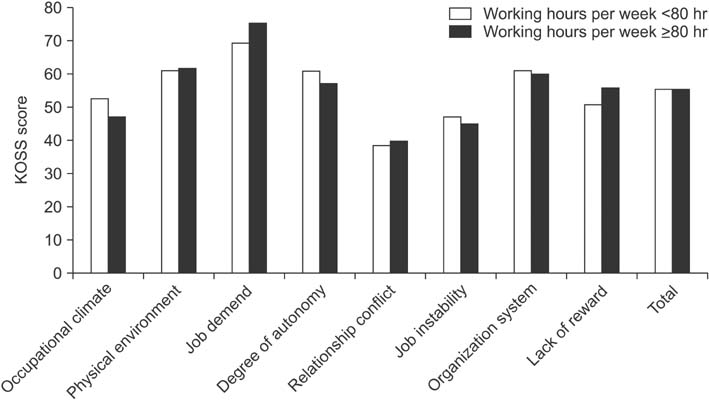Ann Surg Treat Res.
2015 Nov;89(5):268-274. 10.4174/astr.2015.89.5.268.
Occupational stress and related factors among surgical residents in Korea
- Affiliations
-
- 1Department of Surgery, Korea University College of Medicine, Seoul, Korea. drboo@korea.ac.kr
- 2Department of Medical Statistics, Asan Medical Center, Seoul, Korea.
- KMID: 2095533
- DOI: http://doi.org/10.4174/astr.2015.89.5.268
Abstract
- PURPOSE
The application rate for surgical residents in Korea has continuously decreased over the past few years. The demanding workload and the occupational stress of surgical training are likely causes of this problem. The aim of this study was to investigate occupational stress and its related factors in Korean surgical residents.
METHODS
With the support of the Korean Surgical Society, we conducted an electronic survey of Korean surgical residents related to occupational stress. We used the Korean Occupational Stress Scale (KOSS) to measure occupational stress. We analyzed the data focused on the stress level and the factors associated with occupational stress.
RESULTS
The mean KOSS score of the surgical residents was 55.39, which was significantly higher than that of practicing surgeons (48.16, P < 0.001) and the average score of specialized professionals (46.03, P < 0.001). Exercise was the only factor found to be significantly associated with KOSS score (P = 0.001) in univariate analysis. However, in multiple linear regression analysis, the mean number of assigned patients, resident occupation rate and exercise were all significantly associated with KOSS score.
CONCLUSION
Surgical residents have high occupational stress compared to practicing surgeons and other professionals. Their mean number of assigned patients, resident recruitment rate and exercise were all significantly associated with occupational stress for surgical residents.
Figure
Reference
-
1. Kim JH, Jung SS, Lee IK, Song BJ, Moon JH, Jang YS, et al. Status and prospect of workforce requirement for surgery in republic of Korea. J Korean Surg Soc. 2011; 81:363–373.2. Kim SK. How to save surgical residents in crisis. J Korean Surg Soc. 2009; 76:207–214.3. Selye H. The stress of life. New York: McGraw-Hill Book Co.;1956.4. Newbury-Birch D, Kamali F. Psychological stress, anxiety, depression, job satisfaction, and personality characteristics in preregistration house officers. Postgrad Med J. 2001; 77:109–111.5. West CP, Tan AD, Habermann TM, Sloan JA, Shanafelt TD. Association of resident fatigue and distress with perceived medical errors. JAMA. 2009; 302:1294–1300.6. Balch CM, Freischlag JA, Shanafelt TD. Stress and burnout among surgeons: understanding and managing the syndrome and avoiding the adverse consequences. Arch Surg. 2009; 144:371–376.7. Harms BA, Heise CP, Gould JC, Starling JR. A 25-year single institution analysis of health, practice, and fate of general surgeons. Ann Surg. 2005; 242:520–526.8. Yeo H, Viola K, Berg D, Lin Z, Nunez-Smith M, Cammann C, et al. Attitudes, training experiences, and professional expectations of US general surgery residents: a national survey. JAMA. 2009; 302:1301–1308.9. Weinstein DF. Duty hours for resident physicians: tough choices for teaching hospitals. N Engl J Med. 2002; 347:1275–1278.10. Chang SJ, Koh SB, Kang D, Kim SA, Kang MG, Lee CG, et al. Developing an Occupational Stress Scale for Korean employees. Korean J Occup Environ Med. 2005; 17:297–317.11. Maslach C, Jackson SE, Leiter MP. Maslach burnout inventory. Evaluating stress: a book of resources. London: The Scarecrow Press Inc.;1997. p. 191–218.12. Cho JJ, Kim JY, Chang SJ, Fiedler N, Koh SB, Crabtree BF, et al. Occupational stress and depression in Korean employees. Int Arch Occup Environ Health. 2008; 82:47–57.13. Kang SH, Boo YJ, Lee JS, Han HJ, Jung CW, Kim CS. High occupational stress and low career satisfaction of Korean surgeons. J Korean Med Sci. 2015; 30:133–139.14. Veasey S, Rosen R, Barzansky B, Rosen I, Owens J. Sleep loss and fatigue in residency training: a reappraisal. JAMA. 2002; 288:1116–1124.15. Shanafelt TD, Balch CM, Bechamps GJ, Russell T, Dyrbye L, Satele D, et al. Burnout and career satisfaction among American surgeons. Ann Surg. 2009; 250:463–471.16. Yoo MW, Lee IK, Ahn HS, Kim JW, Lee HJ, Lee KU, et al. Survey of the residency training program in surgery. J Korean Surg Soc. 2008; 74:1–9.17. Morrison CA, Wyatt MM, Carrick MM. Impact of the 80-hour work week on mortality and morbidity in trauma patients: an analysis of the National Trauma Data Bank. J Surg Res. 2009; 154:157–162.18. Durkin ET, McDonald R, Munoz A, Mahvi D. The impact of work hour restrictions on surgical resident education. J Surg Educ. 2008; 65:54–60.19. de Virgilio C, Yaghoubian A, Lewis RJ, Stabile BE, Putnam BA. The 80-hour resident workweek does not adversely affect patient outcomes or resident education. Curr Surg. 2006; 63:435–439.20. Shanafelt TD, Oreskovich MR, Dyrbye LN, Satele DV, Hanks JB, Sloan JA, et al. Avoiding burnout: the personal health habits and wellness practices of US surgeons. Ann Surg. 2012; 255:625–633.21. Bertges Yost W, Eshelman A, Raoufi M, Abouljoud MS. A national study of burnout among American transplant surgeons. Transplant Proc. 2005; 37:1399–1401.22. Bittner JG 4th, Khan Z, Babu M, Hamed O. Stress, burnout, and maladaptive coping: strategies for surgeon well-being. Bull Am Coll Surg. 2011; 96:17–22.23. Maslach C. Job burnout new directions in research and intervention. Curr Dir Psychol Sci. 2003; 12:189–192.
- Full Text Links
- Actions
-
Cited
- CITED
-
- Close
- Share
- Similar articles
-
- Occupational stress among medical residents in educational hospitals
- Occupational Stress and Depressive Mood Among Interns and Residents; Relationship between Occupational Stress and Depressive Mood Among Interns and Residents in a Tertiary Hospital, Seoul, Korea
- Occupational Stress and Physical Symptoms among Family Medicine Residents
- Changes in the Health Indicators of Hospital Medical Residents During the Four-Year Training Period in Korea
- A Study of Psychosocial Stress of Residents Near Asbestos Mines



